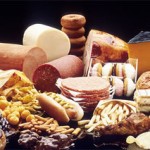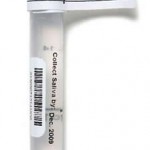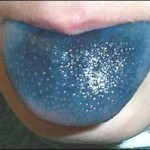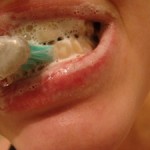 Fats can make any food taste better, and it’s in our interest — genetically — to prefer foods that the body needs. Unfortunately, a typical restaurant meal can have more than eight tablespoons of fat — more than an entire stick of butter. That’s way more than we need in one sitting. (The recommended daily allowance for fat is four and a half tablespoons.) Read more
Fats can make any food taste better, and it’s in our interest — genetically — to prefer foods that the body needs. Unfortunately, a typical restaurant meal can have more than eight tablespoons of fat — more than an entire stick of butter. That’s way more than we need in one sitting. (The recommended daily allowance for fat is four and a half tablespoons.) Read more
Category Archives: Health & Medicine
Are you a supertaster: DNA testing
 You can also have your DNA tested to see if you have the gene for bitter taste. As explained in the post on The genetics of supertasting, however, this may not be all that accurate. “It’s not clear that do-it-yourself genetic testing is worth the price. If you’re concerned about disease, you’d probably be better off with a healthy diet, not smoking, and moderate exercise.” (Since I wrote this post in April of 2009, the FDA has decided to look into new rules on direct-to-consumer genetic testing.) Read more
You can also have your DNA tested to see if you have the gene for bitter taste. As explained in the post on The genetics of supertasting, however, this may not be all that accurate. “It’s not clear that do-it-yourself genetic testing is worth the price. If you’re concerned about disease, you’d probably be better off with a healthy diet, not smoking, and moderate exercise.” (Since I wrote this post in April of 2009, the FDA has decided to look into new rules on direct-to-consumer genetic testing.) Read more
Are you a supertaster: How does PROP taste to you?
 You can purchase supertaster test strips to determine your taste status. The strips are impregnated with a bitter chemical. “You can purchase test strips online from the Supertaster Test website. They come in packages of two, cost $4.95, and the shipping and handling was only an extra $2 for California. They ship internationally and come with a money-back guarantee.” Read more
You can purchase supertaster test strips to determine your taste status. The strips are impregnated with a bitter chemical. “You can purchase test strips online from the Supertaster Test website. They come in packages of two, cost $4.95, and the shipping and handling was only an extra $2 for California. They ship internationally and come with a money-back guarantee.” Read more
Are you a supertaster: Look at your tongue
 How to count the papillae on your tongue, using blue food coloring and a reinforcement sticker. “When you apply blue food coloring to your tongue, what you’re looking for is the areas that do NOT turn blue. The pink, round dots are the papillae. The pink dots on the tongue here are spaced fairly far apart, which makes them easy to count. This could be the tongue of a mildly sensitive taster, but definitely not a supertaster.” Read more
How to count the papillae on your tongue, using blue food coloring and a reinforcement sticker. “When you apply blue food coloring to your tongue, what you’re looking for is the areas that do NOT turn blue. The pink, round dots are the papillae. The pink dots on the tongue here are spaced fairly far apart, which makes them easy to count. This could be the tongue of a mildly sensitive taster, but definitely not a supertaster.” Read more
Are you a supertaster: Do you really want to know?
 A wine connoisseur is better off not being a supertaster. … It’s good to be sensitive to and tolerant of other people – don’t assume the way food tastes to you is universal. … “I would speculate that supertasters probably enjoy wine less than the rest of us. They experience astringency, acidity, bitterness, and heat (from alcohol) more intensely, and this combination may make wine –or some wine styles — relatively unappealing.” Read more
A wine connoisseur is better off not being a supertaster. … It’s good to be sensitive to and tolerant of other people – don’t assume the way food tastes to you is universal. … “I would speculate that supertasters probably enjoy wine less than the rest of us. They experience astringency, acidity, bitterness, and heat (from alcohol) more intensely, and this combination may make wine –or some wine styles — relatively unappealing.” Read more
The genetics of supertasting
 If the supertaster’s ability to detect bitterness (and thus poisons) is so valuable, why did nontasters survive genetically? The evolution of taste discrimination and its survival value. … “Supertasters learn not to eat bitter, poisonous berries after the first bite, not after they get a fatal stomach ache. The explanation could be that tasters and nontasters are sensitive to different sets of bitter tastes, and this combination of sensitivities gives an advantage to medium tasters.” Read more
If the supertaster’s ability to detect bitterness (and thus poisons) is so valuable, why did nontasters survive genetically? The evolution of taste discrimination and its survival value. … “Supertasters learn not to eat bitter, poisonous berries after the first bite, not after they get a fatal stomach ache. The explanation could be that tasters and nontasters are sensitive to different sets of bitter tastes, and this combination of sensitivities gives an advantage to medium tasters.” Read more
What is a supertaster?
 Supertasters, medium tasters, and nontasters … Sensitivity to the bitter taste of the chemicals PTC or PROP … The number of taste buds on the tongue of a supertaster. … Supertaster tongues have more papillae, more taste buds, and are more sensitive to physical stimulation. Taste buds not only transmit information about taste, but information about pain, temperature, and touch. Supertasters detect more bitterness, but also more spiciness, heat, cold, and anything painful. Read more
Supertasters, medium tasters, and nontasters … Sensitivity to the bitter taste of the chemicals PTC or PROP … The number of taste buds on the tongue of a supertaster. … Supertaster tongues have more papillae, more taste buds, and are more sensitive to physical stimulation. Taste buds not only transmit information about taste, but information about pain, temperature, and touch. Supertasters detect more bitterness, but also more spiciness, heat, cold, and anything painful. Read more
Orange juice and toothpaste
 Why does orange juice taste awful after brushing your teeth? All about the detergent in your toothpaste and what it does to the phospholipid bilayer on your tongue. “What’s in your toothpaste? Probably more than you think. Toothpaste contains flourides, abrasives, detergents, thickeners, and water softeners. It also has sweeteners to hide the bad taste of all that other stuff. The ingredient that makes orange juice taste bad is a foaming detergent that cleans your teeth.” Read more
Why does orange juice taste awful after brushing your teeth? All about the detergent in your toothpaste and what it does to the phospholipid bilayer on your tongue. “What’s in your toothpaste? Probably more than you think. Toothpaste contains flourides, abrasives, detergents, thickeners, and water softeners. It also has sweeteners to hide the bad taste of all that other stuff. The ingredient that makes orange juice taste bad is a foaming detergent that cleans your teeth.” Read more
How do you taste?
 An introduction to taste buds – their anatomy, chemistry, and neurophysiology. “The structures involved in taste aren’t exactly like nested dolls. There’s only one Paul inside of John, but there are many taste buds in a papilla, many taste cells in a taste bud, and many taste receptors in a taste cell. The terms papillae, taste buds, and taste receptors come up in subsequent posts, which is why I explain them here.” Read more
An introduction to taste buds – their anatomy, chemistry, and neurophysiology. “The structures involved in taste aren’t exactly like nested dolls. There’s only one Paul inside of John, but there are many taste buds in a papilla, many taste cells in a taste bud, and many taste receptors in a taste cell. The terms papillae, taste buds, and taste receptors come up in subsequent posts, which is why I explain them here.” Read more
A matter of taste
 Taste happens on the tongue, but flavor is a combination of taste, smell, and touch. Without smell (think: stuffed up nose), food loses flavor. … Taste is the most important factor in choosing food, followed by cost. Whether food is actually nutritious and good for us is much less relevant to the decision process. … There are biological reasons for the five tastes — sweet, sour, salty, bitter, and savory. They promote survival. Read more
Taste happens on the tongue, but flavor is a combination of taste, smell, and touch. Without smell (think: stuffed up nose), food loses flavor. … Taste is the most important factor in choosing food, followed by cost. Whether food is actually nutritious and good for us is much less relevant to the decision process. … There are biological reasons for the five tastes — sweet, sour, salty, bitter, and savory. They promote survival. Read more
Coughing Up Blood Money: The Altria Earnings Protection Act?
As I mentioned a few posts back, Altria, the sanitized name for Philip Morris, is the major player in the U.S. tobacco industry. The company spent $12.9 million on lobbying in 2006. And yet they fully support the upcoming bill that gives the FDA control over tobacco, the Family Smoking Prevention and Tobacco Control Act.… Read more
Coughing Up Blood Money: "Before they quit or die"
Source: Flickr It’s fairly common knowledge that the tobacco industry has engaged in nefarious practices, such as secretly verifying the addictive quality of nicotine and strategizing how best to get kids to smoke. If you take a moment to read some of the actual memos and reports that chronicle these goings on, I think you’ll… Read more
Coughing Up Blood Money: The hit parade of cigarette ads
We’ve come a long way in the history of cigarette advertising. Here’s a 1949 commercial for Camels. The “More doctors smoke Camels” campaign was a response to concerns, starting in the 1940s, that smoking caused lung cancer and heart disease. There had been a series of articles on this in the widely read Reader’s Digest.… Read more
Coughing Up Blood Money: FDA regulation of tobacco
Smoking causes lung cancer. We’ve known that for 60+ years. But the regulation of tobacco has happened in slow motion, thanks largely to political lobbying by the tobacco industry. In 2000, the Supreme Court ruled that the FDA could not take it upon itself to regulate cigarettes. It would first need legislative approval from Congress.… Read more
Coughing Up Blood Money: Taxing tobacco, taxing credibility
Roll Call, the daily paper aimed at Washington politicos, gets endorsements such as the following from members of Congress: Former House Minority Leader Richard Gephardt (D-Mo.): “Roll Call is a critical and indispensable tool for deciphering the day-to-day maneuverings of Capitol Hill. Roll Call has its finger on the pulse of Congress.” Former Sen. John… Read more
Not just peanut butter: What's happening to our food supply?
Last year it was tomatoes contaminated with Salmonella. Except not really. After the tomato industry lost $200 million, it turned out it wasn’t tomatoes after all, but jalapeno and serrano peppers from Mexico. Tomatoes aren’t off the hook though. There have been 12 Salmonella-contaminated tomato outbreaks since 1990 serious enough to involve multiple states. In… Read more
Calories: What are we really counting?
The talking calorie pedometer We spend a lot of energy on calories — counting them, avoiding them, feeling guilty about them. But what are calories, anyway? Well, they ARE energy. Specifically, calories are the energy we get from the food we consume. And that makes them a good and essential thing. Calories wouldn’t be a… Read more
Gupta vs. Sicko: Are there socially acceptable mistakes?
Among those opposing Obama’s choice of Sanjay Gupta as the next Surgeon General is Adrian Campbell, a Michigan woman who appeared in Michael Moore’s film Sicko. Gupta told his television audience: In Canada, you can be waiting for a long time. A survey of six industrialized nations found that only Canada was worse than the… Read more
Sanjay Gupta a victim of obesity myths?
One group that opposes the nomination of Sanjay Gupta as the next surgeon general is the Center for Consumer Freedom (CCF), an organization that promotes the interests of the restaurant and food industries. Anyone who suggests eating less can expect criticism from an industry that wants us to eat more. Gupta took on the topic… Read more
Sanjay Gupta, George Lundberg, and Obama’s Enneagram type
Back in November, following a two-hour meeting in Chicago, president-elect Obama offered Sanjay Gupta the position of Surgeon General. (This from a presumably reliable source: Gupta’s mother, Damayanti.) Gupta has been prudently tight-lipped about the appointment ever since the Washington Post broke the story in early January. Gupta, the chief medical correspondent for CNN, discussed… Read more
Science, engineering, and the recession
It was the UK’s Bryan Appleyard who started me thinking about health and the recession. In an article on what to expect in 2009, he interviewed Chris Ruhm, who stands by his 1996 findings that recessions are good for your health. “People get physically healthier and mortality rates fall during bad economic times,” he tells… Read more
Body awareness and the health culture
OK. So the economic downturn is really, really bad. We’re worried about being laid off. We may have already lost our jobs. Even if we’re still employed we have financial worries. And hearing about it all the time on the news gets us down. We start to have physical symptoms of poor health: headaches, muscle… Read more
"Screw You Yahoo"
Losing your job is a powerful stressor that can have a long-term impact on health. A 2006 study by Sullivan and Wachter found that, in the 20 years following the loss of a job, your chances of dying increase by 15 to 20 percent. This makes a lot more sense to me than Chris Ruhm’s… Read more
How to read health news
Here’s a good companion thought to HRT and the incredible shrinking brain. It’s from Dr. Alicia White, an employee of Bazian, the evidence-based medicine firm in Great Britain. Bazian does research for the health news on Behind the headlines, the National Health Service site I recommend as a source of health news. If you’ve just… Read more
HRT shrinks women's brains? What's wrong with this picture?
There was a widely reported story today about hormone replacement therapy (HRT) and a decrease in the size of women’s brains. The headlines were predictably but needlessly sensational. In fact, the study did not measure a decrease in the brain size of any individual woman. Source: Richard Amsel, The Movie Posters First, the headlines. There… Read more
The economy, stress, and health
In October the American Psychological Association (APA) released its Annual Stress in America Survey. Compared to 2007, the 2008 survey found an increase in stress related to money, the economy, job stability, housing costs, and family health problems. Stress-related symptoms also increased: fatigue, feeling irritable or angry, lying awake at night, lack of motivation, feeling… Read more
An upside to the downturn?
Foreclosures. Layoffs. Retirement savings down the tube. One scary or embarrassing financial disaster after another. Such is life in the Great Recession of 2009. What if anything does this mean for our health? It makes intuitive sense that health would suffer. But some research shows we’re actually ‘healthier’ in economic hard times and that death… Read more
The death of a child
One of life’s most tragic events is the death of child. Whether a child falls unexpectedly and hits his head or suffers from a disorder that progresses inevitably towards the premature end of a life – one cannot measure and compare such experiences. We sometimes think of today’s biomedicine as an impersonal, corporate machine that… Read more
Paging Dr. Frankenstein
Yes, there’s mercury in your salmon and melamine in little Jenny’s formula, but not enough to do any real damage. Read more
Eat fish? Don't read this
The LA Times had a story today on melamine in farmed fish from China, the source of 70 percent of farm-raised fish. This isn’t exactly breaking news. Recent melamine-in-milk stories have mentioned melamine in animal feed, which means fish, shrimp, beef, pork, and poultry were likely to be contaminated. Melamine-in-fish stories go back to the… Read more

